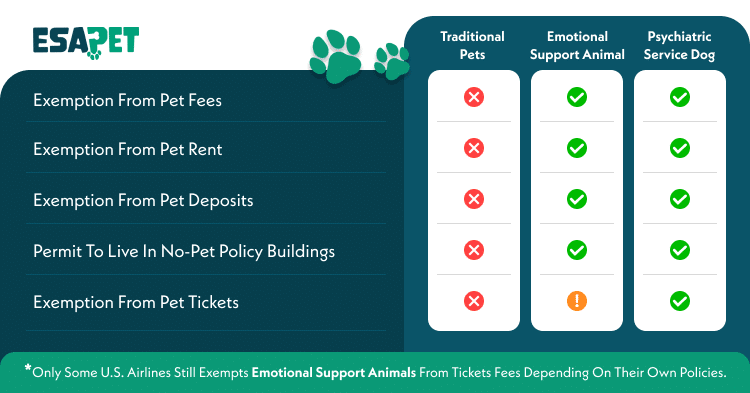ESAs and Pet Deposits: What Can My Landlord Require?

Living with an emotional support animal (ESA) can be life-changing for those coping with mental health challenges. These furry companions provide vital emotional support. However, navigating rental agreements and pet fees can be confusing. Worry not, tenants and landlords. This guide will illuminate the legal landscape surrounding ESAs, specifically demystifying their rights and responsibilities regarding pet deposits and fees.
Understanding ESA laws isn’t just a legal requirement; it’s the key to creating harmonious living environments. When tenants are clear on their rights, and landlords grasp the necessary accommodations, everyone benefits.
This balance empowers tenants to enjoy the full support of their ESAs while ensuring landlords’ interests are protected. By working together within these regulations, the rental market can embrace the positive impact of ESAs and foster thriving relationships between tenants, landlords, and these cherished companions.
Ready to ditch the housing hassle and focus on the genuine magic of ESA relationships? Dive into this comprehensive guide and unlock the secrets to a supportive and fulfilling rental experience for everyone.
Differentiating ESAs from Pets
First things first, let’s distinguish between traditional pets, service animals, and emotional support animals. Traditional pets bring joy and companionship, but they don’t have legal protections in housing. Service animals, trained to perform specific tasks for individuals with disabilities, enjoy full access rights under the Americans with Disabilities Act (ADA).
ESAs fall into a unique category. They provide vital emotional support and comfort to individuals with diagnosed mental health conditions. Unlike service animals, they don’t require specific training, but their presence is integral to their owner’s well-being. Think of them as furry therapists who cuddle away anxiety and loneliness.
To qualify for an ESA, you must have a legitimate diagnosis from a licensed mental health professional, such as a therapist or psychiatrist. This professional will assess your needs and determine if an ESA is a recommended part of your treatment plan. Once diagnosed, your mental health professional will provide you with an official emotional support animal letter. This document serves as legal proof of your need for an ESA and protects you from landlords who might try to impose pet-related fees or restrictions.
Knowing the distinctions between ESAs, pets, and service animals is crucial for both tenants and landlords. Tenants can confidently claim their rights and ensure their ESA’s presence, while landlords gain clarity on the legal landscape and the unique role ESAs play in mental health treatment. This mutual understanding creates a positive renting environment where everyone benefits.
The Fair Housing Act (FHA) and ESA Housing Laws
The Fair Housing Act (FHA) prohibits discrimination against individuals with disabilities, extending protection to ESA owners. Reasonable accommodation under the FHA ensures that landlords cannot impose pet deposits or fees on tenants with ESAs. This federal regulation promotes inclusivity and recognizes the therapeutic benefits of emotional support animals in mitigating mental health challenges.
The FHA defines “disability” broadly, encompassing a range of mental health conditions. This broad definition ensures that individuals with various mental health challenges can qualify for ESA accommodation, enhancing their access to housing options.
Under the FHA, landlords are obligated to make reasonable accommodations for individuals with disabilities. For ESA owners, this means exempting them from pet-related charges and recognizing their need for an emotional support animal. Landlords who fail to provide reasonable accommodation may be subject to legal action for violating the FHA.
Your ESA is Exempt from Pet Fees |
According to the FHA, Emotional Support Animals and Service Dogs are exempt from any pet fees, deposits or pet rents. |
Obtaining an ESA Letter
Validating the need for an emotional support animal involves a comprehensive process. At the heart of ESA eligibility lies a verified mental illness or disability diagnosed by a licensed mental health professional. Think of your ESA as an integral part of your therapeutic journey, providing emotional support and mitigating symptoms through their loving presence. It’s not just about wanting a pet; it’s about recognizing the therapeutic role they play in your health.
It’s important to note that not all mental health professionals can prescribe an ESA. The professional must be licensed and have a therapeutic relationship with the individual seeking an emotional support animal. This ensures that ESAs are prescribed based on a genuine therapeutic need, as opposed to a mere desire for a pet. Online resources like ESA Pet can connect you with qualified professionals and guide you through the process, smoothing the path to securing your furry friend’s protection.
With your valid ESA letter in hand, you are shielded by the Fair Housing Act. Landlords cannot deny you housing, charge additional fees, or impose unreasonable restrictions based on your ESA. Remember, a well-documented and comprehensive ESA letter strengthens your legal footing.
Get your Official ESA Letter Consultation from a licensed therapist.
Get ESA Letter NowCharging Fees for ESAs: Myths and Facts
Dispelling common myths surrounding ESAs is crucial for informed decision-making. Unlike service animals, ESAs are not required to perform specific tasks, but they share equal legal standing when it comes to pet fee-related housing charges. Federal and state laws explicitly prohibit charging pet deposits or fees for ESAs, ensuring fair treatment and accommodation for individuals with mental health conditions.
Some misconceptions stem from a lack of awareness about ESA laws. It’s essential to communicate that ESAs are not subject to the same regulations as traditional pets. Landlords may not charge extra fees, deposits, or rents based on the presence of an ESA, as doing so would violate the legal protections granted under the Fair Housing Act.
While service animals are trained to perform tasks directly related to a person’s disability, ESAs provide comfort and emotional support through their presence alone. This distinction is critical when addressing misconceptions about the necessity of pet-related charges for service dogs and ESAs.
Landlord’s Rights and Responsibilities
Landlords bear the responsibility of providing reasonable accommodation to friendly tenants with ESAs. The concept of “reasonable” accommodation essentially boils down to making adaptations to ensure an inclusive living environment for tenants with ESAs. This can involve exempting ESAs from pet-related fees and deposits and relaxing pet restrictions in specific policies.
While denial of ESA requests is rare, understanding the criteria for such denials is essential for both landlords and tenants. Landlords are encouraged to engage in open communication with tenants requesting ESA accommodation, seeking to understand their needs and finding mutually agreeable solutions.
Landlords also have the right to request a valid ESA letter from tenants seeking accommodation for their emotional support animals. This documentation serves as proof of the therapeutic need for the ESA and ensures that the accommodation request is legitimate under the Fair Housing Act.
Dealing with Damages Caused by ESAs
Addressing damages caused by ESAs is a shared responsibility. Tenants are obliged to cover repair costs for any damages resulting from their animals. Balancing legal protection with practical property management considerations ensures a fair resolution in case of damages caused by emotional support animals.
Landlords should clearly outline expectations and responsibilities related to damages in the lease agreement. This includes specifying the types of damages covered, the procedure for reporting damages, and the timeline for repairs. Open communication between landlords and tenants helps establish trust and facilitates prompt resolution of any issues related to damages.
Landlords should approach damages caused by ESAs on a case-by-case basis, considering factors such as the severity of the damage, the circumstances surrounding it, and the tenant’s responsiveness in addressing the issue. Collaborative problem-solving can help maintain positive landlord-tenant relationships while ensuring that property damage concerns are appropriately addressed.
Exceptions to ESA Accommodation
Landlords can legally deny ESA accommodation in specific situations. These instances include cases where the ESA poses a threat to safety, causes substantial property damage, creates undue financial and administrative burdens, or fundamentally alters the landlord’s operations. Denial, however, requires meeting stringent criteria, and landlords are advised to proceed with caution.
Remember, denial should always be a last resort and only considered after exploring all reasonable accommodations and exhausting alternative solutions. Open communication and collaboration between tenants and landlords are key to navigating these situations constructively and finding win-win solutions.
FAQs (Frequently Asked Questions)
Can a landlord deny housing to someone with an ESA?
Landlords cannot deny housing to someone with an ESA based on their need for emotional support. The Fair Housing Act protects individuals with disabilities, ensuring equal housing opportunities.
How to handle disputes over an ESA pet deposit?
Disputes over ESA pet deposits should be approached by referencing the ESA letter and relevant housing laws. Seeking mediation and understanding the specific terms of the lease agreement is recommended.
Are there specific breeds that landlords may exclude?
Landlords are generally not allowed to exclude specific breeds as ESAs. The focus should be on the animal’s behavior and whether it poses a threat to others.
What rights do ESA owners have during the leasing process?
ESA owners have the right to file a complaint and request reasonable accommodations during the leasing process, including exemption from pet-related charges. Providing a valid ESA letter strengthens their position.
Can landlords charge a monthly fee in addition to a deposit?
No, landlords cannot charge a monthly fee in addition to a deposit for ESAs. The Fair Housing Act prohibits extra fees beyond standard rent and security deposits.
How to educate landlords about ESA rights and regulations?
Educating landlords about ESA rights involves providing accurate information, sharing relevant regulations, and fostering open communication. Landlords benefit from understanding the legal obligations and potential advantages of accommodating ESAs.
Are ESA pet deposits refundable?
ESA pet deposits are subject to the same rules as regular security deposits. Refundability depends on the terms outlined in the lease agreement and the condition of the property upon the tenant’s departure.
Can a landlord ask for additional information about the ESA?
Landlords are limited in the information they can request about the ESA. They can ask for a valid ESA letter confirming the need for accommodation but cannot demand specific details about the individual’s disability.
What recourse do ESA owners have if their rights are violated?
ESA owners facing rights violations can file complaints with relevant housing authorities or seek legal assistance. Keeping records of interactions, including the ESA letter, strengthens their case.
Can a landlord require professional training for an ESA?
No, landlords cannot require professional training for an ESA. Unlike service animals, ESAs are not mandated by federal law to undergo specialized training. Their primary role is to provide emotional support to individuals with mental health conditions.
How to communicate effectively with landlords about an ESA?
Effective communication with landlords involves providing clear and concise information about the ESA, emphasizing its therapeutic role, and presenting a valid ESA letter. An open dialogue helps build understanding and cooperation.
Can I Claim My Emotional Support Dog on My Taxes?
No, ESAs aren’t covered by the IRS regulations about Service Dogs.
Conclusion
Unraveling the legalese surrounding emotional support animals in housing doesn’t have to be a frustrating endeavor. This guide has provided the compass, equipping both tenants and landlords with the knowledge to navigate the landscape with confidence and empathy.
Remember, understanding ESA laws isn’t just a legal requirement; it’s the key to unlocking a world of mutual benefit. Landlords who grasp the Fair Housing Act’s protections for ESAs foster a more inclusive, supportive community. Tenants, armed with valid ESA letters and a clear understanding of their rights, can advocate for their needs while ensuring responsible pet ownership. This creates a win-win scenario: tenants find solace in their furry companions, landlords enjoy peace of mind knowing the rules are followed, and the housing market becomes a welcoming space for diverse needs.

Dogs, Emotional Support Animal, Housing, Travel
French Bulldog Service Dog: Can a French...
Jonalyn Dionio
Jan 21 2025

Emotional Support Animal, Housing
Emotional Support Animals (ESAs) and Ren...
Brenda Mejia
Jan 25 2024



